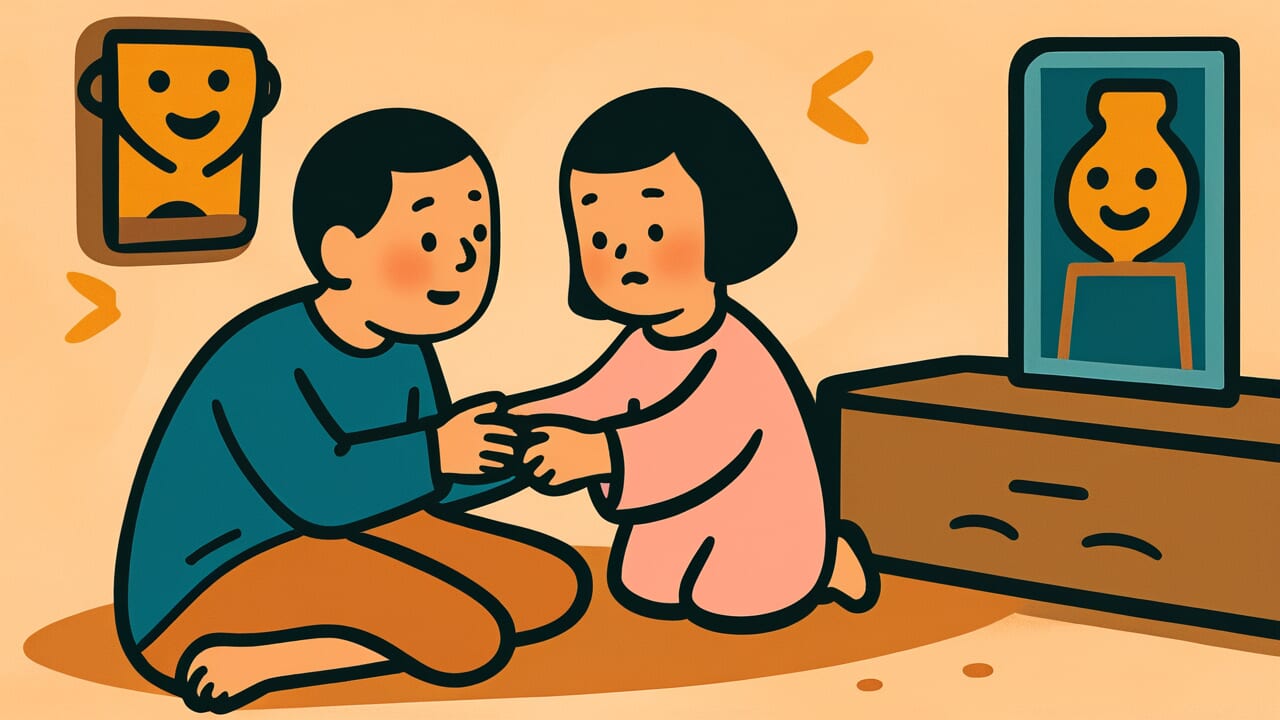How to Read “Children and grandchildren naturally have their own plans”
jison onozukara jison no hakari ari
Meaning of “Children and grandchildren naturally have their own plans”
This proverb means that children and grandchildren have their own ideas and plans. Parents don’t need to worry excessively about them.
Parents often worry about their children’s futures. They tend to interfere too much or try to clear the path ahead.
But children have the ability to think and judge for themselves. Parents should trust them and watch over them from a distance.
People use this proverb when parents become too involved in their children’s lives. It also applies when parents worry too much about the future.
Children are independent beings with their own personalities, separate from their parents. They have the power to carve out their own lives.
The proverb teaches that parents shouldn’t force their values or experiences onto their children. Instead, they should respect their children’s independence.
Today, people often quote this saying when parents and children disagree about education, career paths, or marriage. It serves as a guide for maintaining appropriate distance between generations.
Origin and Etymology
This proverb likely comes from ancient Chinese philosophy. “Jison” means children and grandchildren, while “hakari” means plans or ideas.
The expression “onozukara” means naturally or spontaneously. It describes how things progress without artificial intervention.
Chinese Taoism and Confucianism emphasize following natural principles. They teach that people should avoid excessive interference.
Taoist philosophy especially promotes “wu wei,” or effortless action. This concept encourages people to avoid forced actions and flow with nature.
This proverb reflects that philosophical influence.
After reaching Japan, the saying became a lesson about parent-child relationships. Similar expressions appear in documents from the Edo period.
People used it as a warning against parents worrying too much about their children’s futures.
The phrase recognizes that children and grandchildren are separate individuals from their parents. They have the power to walk their own life paths.
This proverb has become deeply rooted in Japanese family values. It represents wisdom passed down through generations.
Usage Examples
- I was worried about my son’s career path, but “Children and grandchildren naturally have their own plans,” so I decided to leave it to him
- I couldn’t stop worrying about my daughter’s future, but I reminded myself that “Children and grandchildren naturally have their own plans” and held back from interfering
Universal Wisdom
This proverb speaks a universal truth: autonomy is essential for human growth. A parent’s love for their child is deep and unchanging across all eras.
However, when that love becomes overprotection or excessive interference, it actually hinders the child’s growth.
Humans naturally possess the power to carve out their own lives. When facing difficulties, the experience of thinking, judging, and acting independently helps people grow.
If parents remove all obstacles ahead of time, children lose the chance to develop problem-solving skills.
This proverb has been passed down through generations because it captures a fundamental dilemma in parent-child relationships. Parents want to protect their children and make them happy.
But what truly makes children happy is having the strength to stand on their own feet and walk their own path.
Within this contradictory emotion, parents face an eternal question. How far should they reach out their hand, and when should they pull it back?
This proverb quietly teaches the difficulty and importance of trusting and watching over children. It reminds us that letting go is an act of love.
When AI Hears This
The fact that parents cannot perfectly design their children’s futures relates to fundamental principles of complexity science. A complex system has many elements that interact to create unpredictable properties.
Consider an ant colony. Each individual ant follows simple rules. Yet the colony as a whole builds remarkably efficient nests and transports food.
Scientists call this “emergence.” Simple interactions at lower levels spontaneously create complex order at higher levels.
Generational succession in humans has the same structure. Parents pass down their knowledge and values.
But children get thrown into environments their parents never experienced. Children then create solutions their parents never imagined through interactions between inherited information and new environments.
This isn’t assembly following a blueprint. It’s a process called self-organization.
Interestingly, when parents intervene excessively and try “perfect design,” they actually inhibit this emergence. Complexity research shows that without adequate randomness or freedom, systems become rigid.
They cannot adapt to environmental changes. Leaving room for descendants to make their own plans is actually the most rational strategy, both biologically and sociologically.
Lessons for Today
This proverb teaches modern people the courage to trust. If you’re a parent, trusting and watching over your child may be harder than doing something for them.
You might worry they’ll fail or get hurt. But set that worry aside for a moment and believe in your child’s potential.
Modern society overflows with information. There’s a strong tendency to seek correct answers.
Parents want their children to walk the best path, so they tend to clear the way ahead. But there’s no single correct answer in life.
What matters is developing the ability to think, choose, and learn from the results.
If you’re in the child’s position, understand that your parents’ worry comes from love. But have the courage to decide your own life.
And when you become a parent someday, remember these words. Wisdom passed down through generations contains the essence of human relationships.
Maintaining appropriate distance while respecting each other creates true bonds. This is how families grow stronger across generations.



Comments